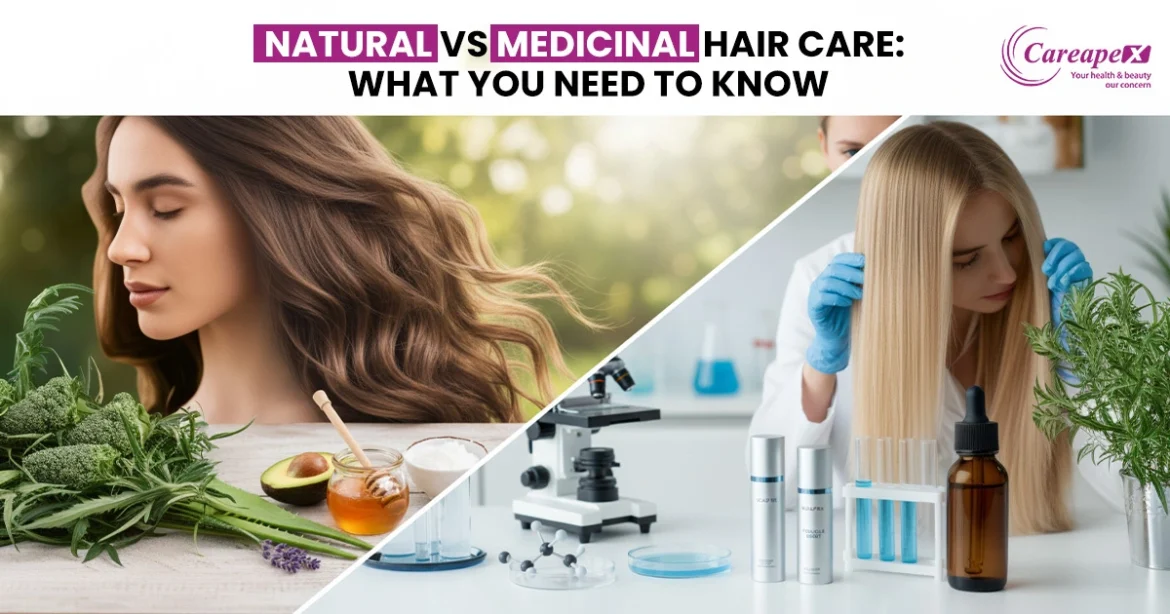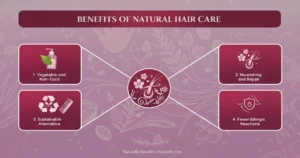Natural vs. Medicinal Hair Care: What You Need to Know

Each day, our hair battles pollution, stress, and the effects of harsh products that strip away its natural beauty. As a result, people are becoming more conscious of what they apply to their hair. The issue of natural vs. medicinal hair care has been more popular than ever. Should you trust traditional, plant-based remedies or rely on scientifically formulated treatments? The thing is that they are not without their advantages, and knowing them can help you make a better decision about the health of your hair.
In this blog, we’ll dive deep into natural vs. medicinal hair treatments, compare natural hair care products with medicinal hair care solutions, and help you discover which option might be best for your hair needs.
Understanding Natural Hair Care
Natural hair care is based on natural ingredients, i.e., herbs, essential oils, plant extracts, and organic compounds. The products do not contain harsh chemicals such as sulfates, parabens, silicones, and artificial fragrances, which may have a damaging effect on the scalp and hair in the long run.
Usual examples of natural hair care products are shampoos based on aloe vera, coconut oil, argan oil, or hibiscus, conditioners based on shea butter or avocado, hair masks based on amla, bhringraj, or fenugreek.
Natural care is aimed at nourishing your hair at the root, to the end, to give it its natural texture and to keep everything in equilibrium without toxins. Natural remedies are highly valuable to individuals who have sensitive scalps or those who practice environmentally friendly lifestyles.
Benefits of Natural Hair Care

- Vegetable and Non-Toxic: Natural substances normally do not contain any harsh chemicals that will deprive the skin of its natural oils or cause bad skin irritation to the scalp.
- Nourishment and Repair: Vitamins and fatty acids that are found in botanical extracts and oils strengthen hair follicles and help them grow.
- Sustainable Alternative: The majority of natural hair care products are cruelty-free and prepared with ecologically friendly processes.
- Fewer Allergic Reactions: since there are fewer artificial additives, these products are less likely to be irritants or result in allergic reactions.
Natural is not necessarily risky. Natural ingredients such as essential oils or herbs can still affect some people, and the outcome of these reactions usually takes time to manifest itself.
What Are Medicinal Hair Care Solutions?
Although there is the appeal of natural remedies, the medicinal solutions of hair care are formulated based on the state-of-the-art dermatological science. These are treatments that specialists create to address specific hair and scalp problems, such as dandruff, hair thinning, alopecia, and scalp infections.
Medical hair care can contain products that have active ingredients that are clinically tested, like minoxidil, ketoconazole, or biotin, which are known to induce hair growth, reduce oil production, or cure fungal infections.
They are usually prescribed or advised by dermatologists and can be included in a tailor-made treatment.
Benefits of Medicinal Hair Care
- Scientifically Proven Results: Clinical trials are used to test medical products against efficacy, safety, and performance.
- Specific Problems: They correct such particular issues as loss of hair, scalp psoriasis, or persistent dandruff, which cannot be treated using natural methods.
- Quicker Results: Most of the medicinal hair care products present results within weeks after regular use.
- Dermatologist Approved: The majority of medicinal products are created or prescribed by medical experts to be as safe and effective as possible.
Yet, there are some side effects of the medicinal treatments, like drying, irritation, or addiction to constant use. This is why one should seek professional advice before commencing any medicalized hair regimen.
Natural vs. Chemical Hair Treatments: The Real Difference
The distinction between natural and chemical hair treatments is in the formulation and in the long-term effects.
- Chemical treatments of hair (coloring, straightening, perming) are synthetic materials that are used to modify the structure of your hair. Although they have fast and noticeable outcomes, their consistent use may result in poor hair quality by damaging the hair strands and causing them to split.
- On the contrary, natural therapies aim at restoring health and balance. They act slowly and also have a more lasting effect, which fortifies the hair internally.
Medical products may be positioned between natural and synthetic components in the middle; they are usually composed of both to provide specific and scientifically proven effects with the lowest harm.
Therefore, in case of fast-fix solutions to a special occasion, chemical treatment could be useful. However, when you want your scalp to be healthy over time and shine naturally, then the natural or medicinal direction is going to be more useful.
When to Choose Natural Hair Care vs. Medicinal Hair Care
Choose Natural Hair Care If:
- You possess slightly hairy or scalp problems.
- You go natural, environmentally friendly.
- You desire to have healthy hair without having to use harsh chemicals.
- You are oriented towards prevention and not cure.
Selected in case of:
- You have serious cases of dandruff, hair loss, or infections of scalp infections.
- You have experimented with natural remedies with marginal success.
- You require treatments that are recommended by dermatologists and have been clinically proven to be effective.
- You are searching for quicker and briefer results.
In other situations, a mixture of the two methods, such as applying a mild herbal shampoo with a medicinal serum prescribed, may serve the purpose of giving the best of both.
Finding the Right Balance for Your Hair
Naturally, the concept of natural vs. medicinal hair care is not about one being better than another, but it is about knowing what your hair requires. Others are comfortable with a one-hundred percent natural routine, and others need hospital-level care for chronic conditions. The key is balance.
To achieve the best results, it is best first to determine your hair type, scalp condition, and lifestyle. It can be recommended to a hair specialist or dermatologist who will be able to help develop an individual routine that will incorporate both natural hair care products and medicinal hair care solutions.
At Careapex, we believe that healthy hair starts with informed choices. Whether you lean toward natural remedies or trust scientifically backed treatments, consistency and quality matter most. Give your hair the care it deserves, naturally, medicinally, or both, and watch it thrive.
Final Thoughts
The argument of natural or medicinal hair care is rather a question of complementary science and nature than a matter of rivalry. Knowing both of them, you will be able to adopt the routine that will make your hair stronger, more vital, and beautiful at its root and end.
The ideal process of hair care starts once you hear your scalp, believe what your body says, and make a decision that is supported by both tradition and innovation.
Frequently Asked Questions
- Is natural hair care better than medicinal hair care?
Not necessarily. Natural hair care nourishes your hair gently over time, while medicinal products target specific issues like dandruff or hair loss. The best choice depends on your hair needs and scalp condition. - Can I combine natural and medicinal hair care products?
Yes, combining both can be effective. For instance, you can use a natural shampoo with a dermatologist-prescribed serum to balance nourishment and treatment. - How do I know which type of hair care is right for me?
Assess your hair type, scalp sensitivity, and hair concerns. If you have persistent problems, consult a dermatologist; for general maintenance, natural care is often sufficient.
